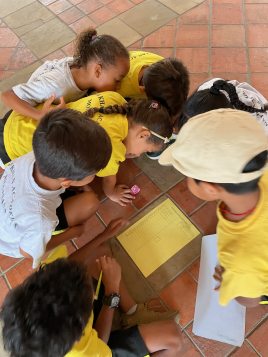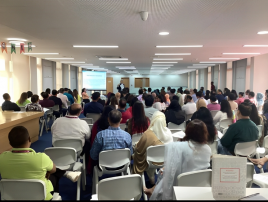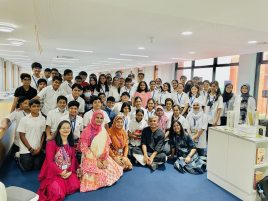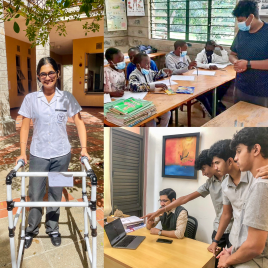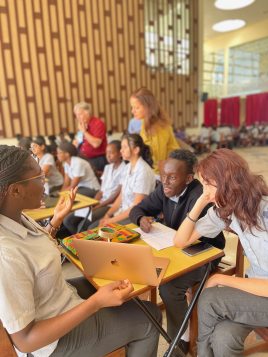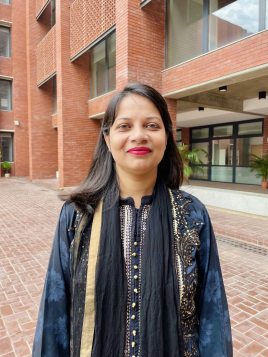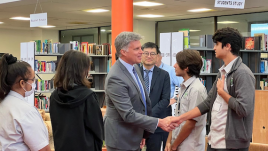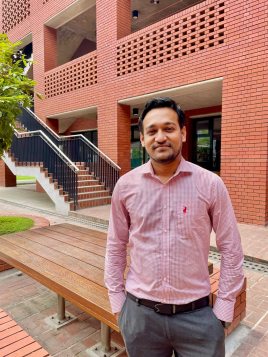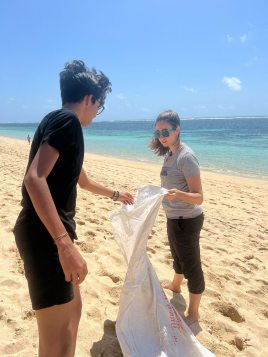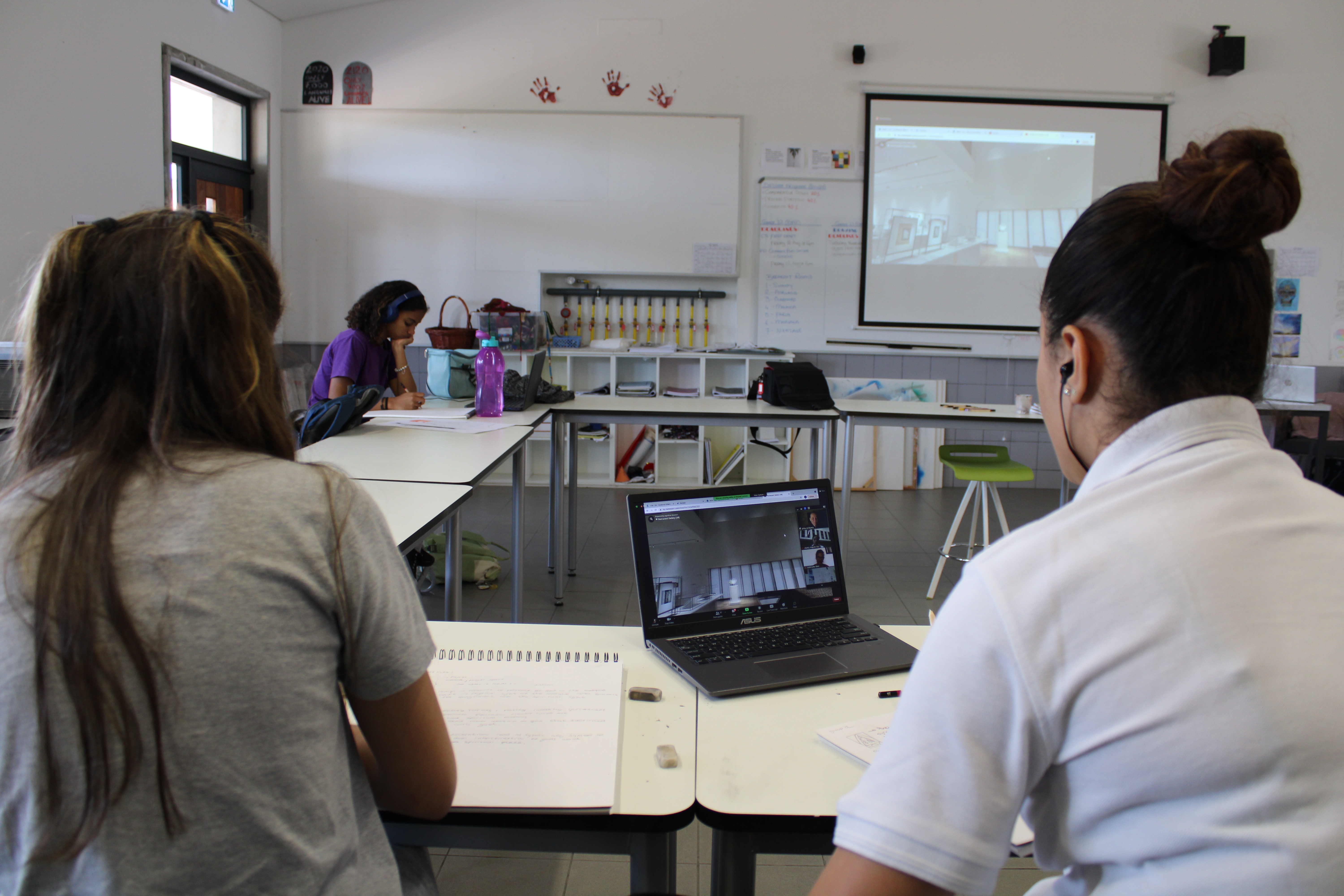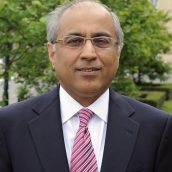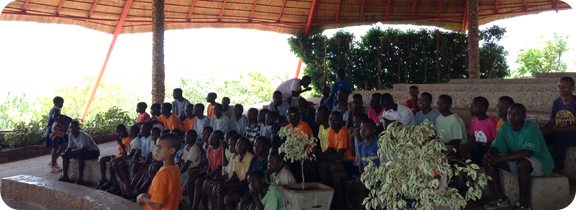
Community Service
Community service is an overarching and major facet of student education and experience at the Academies. Incorporated into student life and the curriculum, community service extends the educational experience beyond the classroom, informing students of the real-world implications of their studies. Through community projects with local organisations and groups, students gain a sense of the interconnectedness of their education with the world around them.
Students can participate in a variety of structured community initiatives and internships to learn about their place in the world.
By partnering with local Aga Khan Development Network agencies, students learn first-hand about the operations of an organisation and work towards making tangible contributions to the agencies.
In addition, community engagement provides an understanding of broad concepts such as human rights, dignity and autonomy, while emphasising the ethos of leaving the world a better place.
Examples of service projects from the Aga Khan Academy Mombasa:
Coast Rural Support Programme: Tree planting at Mtaa community reservoir. The reservoir was created as a community project. The outreach project involved planting 700 indigenous seedlings around the reservoir.
East African Quality in Early Learning: Creation of the Fun Reading Day initiative to promote early grade reading. Inspired by the common 1:10 ratio of students to books in local public primary schools, the first project was to collect books to establish a library at Ng’ombeni Primary School. Through a book drive and other community projects, students collected books and catalogued and prepared them for library use.
Our Junior School and Diploma Programme (DP) students visited the Ng’ombeni Primary School for group reading sessions. This project was then handed over to upcoming DP students to continue.
Education for Marginalised Children in Kenya (EMACK): Student’s council training workshop at Longo Primary School. Sarrah Sheikh came to know the Longo Primary School through her summer placement service. She went on to assist EMACK in establishing student leadership bodies, beginning with Longo Primary School. Topics covered went from effective leadership to communication tools, and the difference between prefects and elected student leaders. Three weeks after this project, the Kenyan government announced the phasing out of the prefect system and the introduction of elected student councils.
Madrasa Resource Centre: School painting project at Mpirani Nursery School. After visiting a school in disrepair, the DP students decided that a bright place was needed for the students to learn. They mobilised their fellow students to create bright learning materials and to repaint the school.
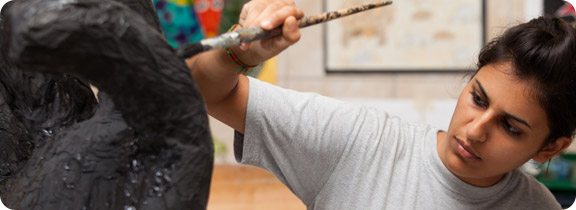
Partnerships
Each Aga Khan Academy benefits from the combined experience of the network of Academies as well as from partnerships with other global networks and institutions. These linkages enable the development and support of world-class standards of excellence.
Aga Khan Development Network
The Aga Khan Academies are one of the key education programmes of the Aga Khan Development Network (AKDN), whose institutions are engaged in a wide array of development initiatives.
AKDN draws on over a century of experience in education from pre-primary to tertiary levels, and includes more than 240 schools and two universities. Students and faculty at each Aga Khan Academy are able to access the intellectual and programmatic resources of AKDN institutions, including the Aga Khan University, the University of Central Asia, the Aga Khan Education Services, the Aga Khan Foundation and the Aga Khan Trust for Culture. The Academies also work in close partnership with AKDN institutions and programmes around the world to provide practical experience opportunities through internships for students and alumni.
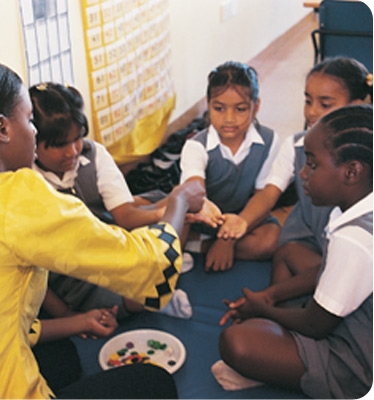
Other leading institutions
The Aga Khan Academies have established formal partnerships with governments, universities and other leading organisations to ensure high standards of practice and foster innovation. Some of the areas that Academies’ partnerships support include best practices in teaching and learning, innovative approaches to teacher education, development of quality campus facilities, supplementary education opportunities for students and access to higher education for talented Academies graduates in need. The Academies have also established partnerships with Ministries and Departments of Education to help strengthen education provision in the countries where our schools are located. Current partners include:
Agencies of the Aga Khan Development Network | International Baccalaureate | Government of Ontario, Canada | Agence Française de Développement | The University of British Columbia Concordia University | California State University, Northridge | Ryerson University | Ministry of Education, Science and Technology, Kenya | Ministry of Education and Human Development, Mozambique | Department of School Education, Telangana, India
In addition, the Academies collaborate with a number of schools and other organisations locally and internationally in areas of mutual interest and to share knowledge and experience.
The IB network
AKDN has a formalised relationship with the International Baccalaureate (IB) through a Memorandum of Understanding between the two organisations.
As IB World Schools, the Academies are closely linked to a network of dynamic IB institutions in over 125 countries, united by a common vision for education and global standards. Guided and facilitated by the IB, this network uses face-to-face conferences and workshops as well as technology to enable teachers and school leaders to gain from each other's experience and to share projects and initiatives.
Ensuring world-class standards
Being connected to these global networks and institutions enables the Academies to test and validate their standards of excellence. These partnerships contribute to the quality of the curriculum and professional development programmes, and ensure that the Academies maintain and enhance their high international standing.

English Language Programme
Prior to opening the Lower Junior School in August 2013, the Aga Khan Academy, Maputo will be offering a series of English language programmes. The programmes will start in February 2013 and run until the end of March 2013.
Prior to opening the Lower Junior School in August 2013, the Aga Khan Academy in Maputo will be offering a series of English language programmes. They will start in February 2013 and run until the end of March 2013.
The programmes are for children, aged between 4 and 8 years old, who wish to improve their English language ability prior to applying for admission to the Academy in August 2013. Throughout there will be a strong emphasis on communicative language development, but the programme will also include the development of reading and writing skills.
Dates for the programmes:
- Programme 1 – 25 February to 1 March
- Programme 2 – 18 Mar to 22 March
- Programme 3 – 25 Mar to 29 March
The day will begin at 0900 and finish at 1500. We regret that spaces are limited to 20 children per week, so please register early. Note that children can only be registered for one programme during this time and admission will be subject to an interview with the Academic Director.
The programmes will be located in an existing building in Moztex, Matola, while the main Academy is being built on a site nearby.
- For further information, please contact Lee Davis, Director of Academic Planning and Development (lee.davis@akdn.org).

Community Links
The vision set out by His Highness the Aga Khan is for each Academy to become an integral part of the greater community in which it resides. This value applies not only to the students but also to the teachers at each of the Academies.
This focus comes into play at the admissions stage where potential students are chosen not only for their thirst for knowledge and intellectual merit, but also for having a high level of social awareness. This includes the desire to work towards, and instigate, positive change and the potential for leadership in community service.
Community service plays a large part in each of the levels of education offered at the Academies, which in turn allows for graduates that are civic minded. In choosing the sites for each school, special attention is paid to not only what the area can offer the students but also what the Academy can offer the community.
While supporting students in developing an understanding of global issues, the Academies’ educational programmes also reflect great sensitivity to local languages, history, cultures and environment. Each school is committed to inspiring and empowering students to use their gifts for the betterment of humanity.
Creativity, activity, service
In choosing the International Baccalaureate programme, the Aga Khan Academies chose to incorporate the creativity, activity, service (CAS) component.
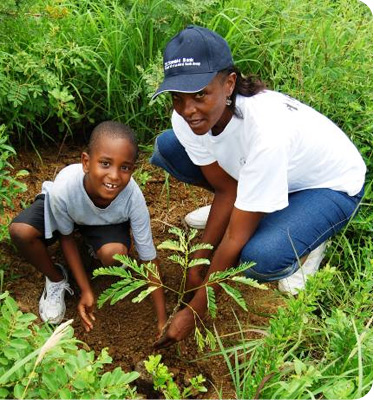
This integral programme is designed to create global citizens through active participation in and reflection upon experiences gained through a variety of creative endeavours, physical activities and community service projects.
Students develop a greater level of self-confidence, teamwork and leadership skills, and a sense of civic responsibility.They take part in sustainable projects that have real and lasting effects on the greater community. And they develop strength of character and an understanding of their ability to bring about change.
The CAS programme is valued for its power to transform not only the lives of students but also those with whom the students interact.
It also serves as a platform for interpersonal exchange, personal growth and greater understanding of the issues we face as a global community.
For more information of our CAS projects in action, visit our school websites.
Professional development outreach
Emphasis on community outreach and service is extended to the staff at each Academy as well, especially the teaching staff.
Each school will incorporate a Professional Development Centre (PDC), which will promote excellence in teaching on campus and strengthen the profession of teaching in the region as well.
"At the Academy, I feel part of a community. I am active in service projects that are making a real and lasting difference to people. I had no idea how important this would become for me."The Academy’s PDC supports excellence in teaching by promoting best practices in teaching and learning and by providing ongoing, collaborative training of Academy faculty as well as teachers and headteachers from neighbouring government, private and not-for-profit schools.
Faculty members are also enriched by opportunities to collaborate with colleagues across the globe and to teach abroad within the Aga Khan Academies network.
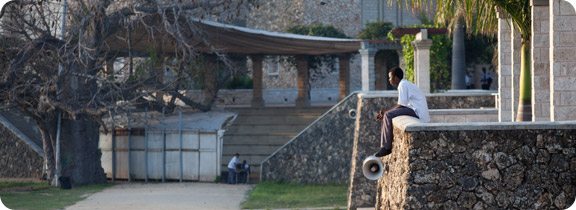
The Aga Khan Development Network
The Aga Khan Development Network (AKDN) is a group of non-denominational agencies that work to improve living conditions and opportunities for the poor across countries of the developing world. Building on an underlying ethic of compassion for the vulnerable in society, the agencies in the Network focus on health, education, culture, rural development, institution building and the promotion of economic development.
Education is a central focus of the AKDN. The Network has been involved in education in the developing world for over a century. Its education programmes cover a wide spectrum of activities, from pre-primary to post-secondary education, teacher training, literacy programmes, school improvement and educational policy reform. The AKDN aims to increase access to quality education for all, particularly those that historically have been underserved or excluded.
The Aga Khan Academies form one arm of the Network's education endeavours. The Academies' focus on developing future leaders is complemented by the work of several other AKDN agencies. Together they provide programming that addresses a range of educational needs across the societies in which they operate. In addition to the Academies, the AKDN's lead organisations in education include the Aga Khan University, the University of Central Asia, the Aga Khan Education Services and the Aga Khan Foundation.
Within the AKDN framework, the Aga Khan Academies exist to both educate exceptional students and disseminate new teaching techniques and learning approaches. Investing heavily in the professional development of teachers is critical to the Academies’ mission of providing students with a rigorous academic and leadership experience.
Learn more about the Aga Khan Development Network, and its work in education and other focus areas, on the AKDN website.
Student Exchange 2019

Student Exchange 2019: Photo Galleries
Photo Gallery: AKA Mombasa students visiting AKA Hyderabad
Photo Gallery: AKA Hyderabad students visiting AKA Mombasa



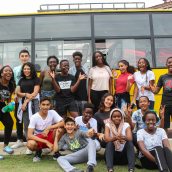
Join our students on their exhange journey by taking a look at our first photo gallery.

Director's Welcome
Director of AcademiesThe Aga Khan Academies is a network of schools being established by His Highness the Aga Khan.
As the Director of Academies, I have been entrusted with His Highness’s extraordinary vision for the Academies as a global learning community, where young people develop the capacity to become future leaders of civil society.
The underlying idea of the Aga Khan Academies network is to concentrate substantial resources on those exceptional individuals – students and teachers – who have the potential to transform society. When provided with a world-class education, exceptional students from any background can achieve their significant potential and in so doing improve their lives, the lives of their families, their communities, their country and the world.
Each Aga Khan Academy will reach out to students of all backgrounds, regardless of culture, race, religion or financial circumstance.
The Academies follow the International Baccalaureate (IB) curriculum, ensuring a global standard of educational excellence and external validation through the annual IB Diploma exams.
The Academies also work to enhance the quality of teaching, the base on which good education rests. Each Aga Khan Academy will provide professional development programmes for teachers and school leaders from within the Academy as well as from government and other schools.
The students in our existing Academies are already achieving exceptional results across domains spanning academics, athletics and the arts. And our alumni, many of whom attend leading universities around the world, are demonstrating a deep sense of social responsibility and a commitment to return to serve their home countries.
Ultimately, we hope that the qualities of good leadership – sound moral judgment, self-discipline, a pluralistic outlook and civic responsibility – are the qualities that will distinguish Aga Khan Academy graduates.
"Our goal, then, is not to provide special education for a privileged elite – but to provide an exceptional education for the truly exceptional." I invite you to explore our website further to learn more about the Aga Khan Academies and the unique and innovative programme they offer.
With warm wishes,
Salim A.L. Bhatia
Director of Academies
News
